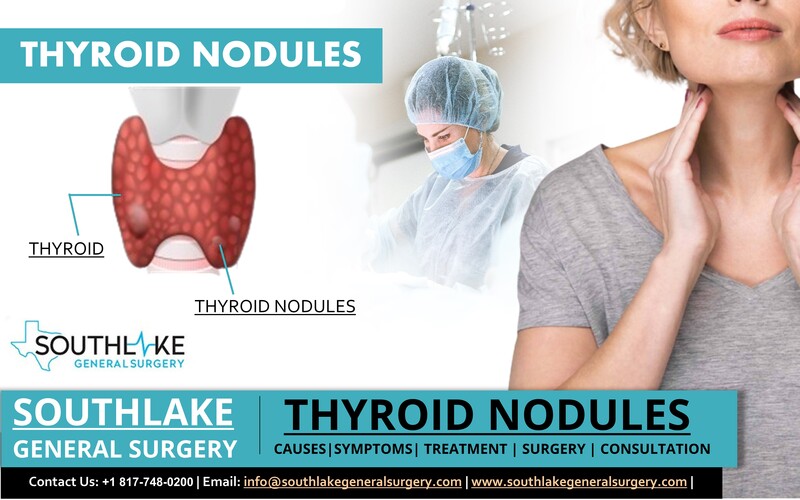Thyroid nodules are solid or fluid-filled lumps of thyroid cells within the thyroid gland. Thyroid hormones are produced by the thyroid gland that influences pulse, metabolism, and other parts of the body.
How much severe are Thyroid Nodules?
Thyroid nodules are not serious for an individual since you can’t feel them. They occur due to abnormal growth of cells and many of the thyroid nodules aren’t cancerous.
According to a study, 1 out of 10 thyroid nodules can cause cancer and benign (noncancerous) thyroid nodules are common among people who are old.
Noncancerous thyroid nodules may not require any treatment. However, your doctor will examine to look for any unusual growth and any other problem.
How many types of Thyroid Nodules are there?
There are three types of thyroid nodules that do not cause cancer:
- Multinodular Goiter – This category has many nodules and might produce excess hormones along with influences on the other structures.
- Thyroid Cysts – It might happen due to an injury and contains fluid with other debris.
- Toxic Nodules – This type of nodules produces excess thyroid hormones that can cause hyperthyroidism and increase the metabolism of the body.
What are the symptoms of Thyroid Nodules?
Generally, there are no symptoms of thyroid nodules. In case, thyroid nodules are bigger in size, you may experience:
- Problem in swallowing
- Breathing problem
- Change in voice such as hoarseness
- A tickling sensation in the throat
If a nodule affects the thyroid to produce excess hormone this refers to “hot nodule.” This may lead to:
- Weight loss
- Weak bones
- Intolerance to heat
- Anxiety and irritation
- Muscle weakness
- Irregular heartbeat
At times thyroid nodules produce fewer thyroid hormones. This condition can cause symptoms of hyperthyroidism:
- Tiredness
- Depression or Memory loss
- Weight gain
- Weakness in muscles, muscle aches, or stiffness
- Increase in the level of cholesterol
- Cold sensitivity
- Hoarseness
- Constipation
- Dry skin
- Swollen face
- Pain joints
- Hair thinning
What are the causes of Thyroid Nodules?
There is not any specific reason for thyroid nodules. However, the various health issues can lead to nodules. It may include:
- Thyroid Cancer – Many thyroid nodules are not cancerous; however, a few can cause cancer.
- Deficiency of Iodine – Lack of iodine in your diet can lead to thyroid nodules. It is rare in the U.S. because iodine is added to various food items.
- Thyroiditis – This condition is a chronic inflammation of the thyroid. Hashimoto’s disease is another form of thyroiditis. It’s also connected with low thyroid activity also known as hypothyroidism.
- Thyroid Adenoma – This is an inexplicable abnormal growth of the thyroid tissue. Many of the adenomas are not dangerous, a few of them produce thyroid hormone. This condition leads to hyperthyroidism (an overactive thyroid).
What are the risk factors for Thyroid Nodules?
Thyroid nodules are common among the age group of 60 years, almost half of the population have them. At times, thyroid nodules might appear very small during the thyroid ultrasound.
There are many factors that can increase the growth of thyroid nodules, that include:
- A diet that doesn’t have iodine in it.
- A history of radiation exposure on the neck or head.
- Family history of thyroid nodules.
- Being older
- Being a female
How to diagnose Thyroid Nodules?
An individual can find it by looking in the mirror. Raise your chin and swallow, the bump on one or the other side of the neck close to Adam’s apple. Gently place your fingers on the neck and you can feel for a bump. In case you identify one, speak to your doctor about it. Approximately 90 percent of the nodules are benign (noncancerous).
To diagnose thyroid nodules your doctor may prescribe for few tests to examine if it is cancerous or not, that includes:
- Blood test to examine thyroid hormones.
- Thyroid scan
- Ultrasound
- Biopsy
For a biopsy, the doctor will insert a fine needle into the thyroid nodule to collect a sample of cells and further, it will send to a lab.
If noncancerous thyroid nodules increase in size, it can create problems such as breathing issues and problems in swallowing.
Thyroid Nodules Treatment
Treatment of noncancerous thyroid nodules may include:
- “Wait and Watch”
- Thyroid hormone therapy (THT)
If nodules cause hyperthyroidism, then treatment might include:
- Radioactive iodine
- β – blockers
- Medicines for antithyroid
- Thyroid Surgery
Cancerous thyroid nodules can be treated with thyroid surgery. Surgery can also use for over large thyroid nodules and for those that change or develop abnormal features with time.
Appointment
For more information on Thyroid nodules – Causes, Symptoms, Diagnosis, Treatment, Surgery, and Consultation. You can contact our healthcare expert today at +1 (817) 748-0200. You can also make an online appointment with us.

